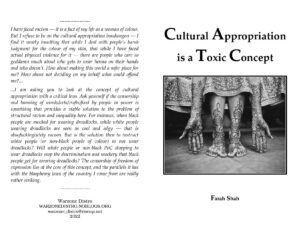
From back cover:
“I have faced racism — it is a fact of my life as a woman of colour. But I refuse to be on the cultural appropriation bandwagon — I find it nearly insulting that while I deal with people’s harsh judgment for the colour of my skin, that while I have faced actual physical violence for it — there are people who care so goddamn much about who gets to wear henna on their hands and who doesn’t. How about making this world a safer place for me? How about not deciding on my behalf what could offend me?…
…I am asking you to look at the concept of cultural appropriation with a critical lens. Ask yourself if the censorship and banning of words/arts/crafts/food by people in power is something that provides a viable solution to the problem of structural racism and inequality here. For instance, when black people are mocked for wearing dreadlocks, while white people wearing dreadlocks are seen as cool and edgy — that is absofuckinglutely racism. But is the solution then to instruct white people (or nonblack people of colour) to not wear dreadlocks? Will white people or nonblack PoC stopping to wear dreadlocks stop the discrimination and mockery that black people get for wearing dreadlocks? The censorship of freedom of expression lies at the core of this concept, and the parallels it has with the blasphemy laws of the country I come from are really rather striking.”